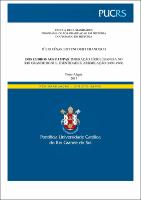| Share record |


|
Please use this identifier to cite or link to this item:
https://tede2.pucrs.br/tede2/handle/tede/7771| Document type: | Tese |
| Title: | Dos cedros aos pampas : imigração sírio-libanesa no Rio Grande do Sul, identidade e assimilação (1890-1949) |
| Author: | Francisco, Júlio César Bittencourt  |
| Advisor: | Murari, Luciana |
| Abstract (native): | Esta tese refere-se à história e à memória da imigração sírio-libanesa no Rio Grande do Sul, no período que vai do último decênio do século XIX até a década de 1940, mais precisamente entre os anos de 1890 e 1949, lapso temporal que corresponde a duas gerações de imigrantes, entre sua chegada ao país, adaptação à nova terra e integração à cultura gaúcha. Tem como objetivo contribuir para o conhecimento das origens da imigração árabe no estado, os períodos em que aqui chegaram os imigrantes, seus locais de fixação, as atividades que exerceram, as sociabilidades que construíram, as instituições que fundaram, especialmente em Porto Alegre. A análise está baseada na utilização de fontes diversas, tais como livros e artigos de periódicos; documentação primária reunida em arquivos históricos e museus; entrevistas; literatura acadêmica, memorialista e de cunho biográfico; além de sites e documentação eletrônica encontrados na internet. Do ponto de vista metodológico, destaca-se a utilização da história oral como instrumento privilegiado de produção, análise e interpretação de dados e informações coletados por meio de depoimentos concedidos ao autor por descendentes de imigrantes árabes residentes no Rio Grande do Sul. A fim de situar o imigrante sírio-libanês de fins do século XIX e início do XX, num Oriente Médio mergulhado em questões transnacionais, o trabalho aborda inicialmente o período de desintegração do Império Otomano, a implementação do Mandato Francês na Síria e no Líbano no começo da década de 1920 e as suas consequências no Rio Grande do Sul, até as independências desses países no fim da década de 1940. Procurou-se demonstrar quem são e de que forma esses imigrantes oriundos do Oriente Médio se organizaram e se inseriram no Rio Grande do Sul, onde se estabeleceram quando chegaram e de que forma construíram suas sociabilidades. Tudo isso em meio a um ambiente dominado por outras levas migratórias mais numerosas. O principal resultado da pesquisa foi a certeza de que o maior patrimônio dos descendentes de imigrantes sírios e libaneses é o pertencimento à cultura gaúcha, com a qual se identificaram, sem, no entanto, deixarem de se reconhecer como libaneses ou árabes, com todos os significados e representações que isso implica. |
| Abstract (english): | This thesis refers to the history and the memory of Syrian-Lebanese immigration in Rio Grande do Sul, in the period from the last decade of the nineteenth century to the 1940s, more precisely between the years of 1890 and 1949, a temporal lapse that corresponds to two generations of immigrants, between their arrival in the country, adaptation to the new land and integration with the ‘gaucho’ culture. It aims to contribute to the knowledge of the origins of the Arab immigration in the state, the periods in which immigrants arrived, their places of fixation, the activities they carried out, the sociability’s they built, the institutions they founded, especially in Porto Alegre. The analysis is based on the use of diverse sources, such as books and periodicals; primary source documentation gathered in historical archives and museums; interviews; academic, memoirist and biographical literature; as well as websites and electronic documentation found on the internet. From a methodological point of view, the use of oral history as a privileged instrument for the production, analysis and interpretation of data and information made possible collected and highlight testimonies given by Arab descendants residing in Rio Grande do Sul. To situate the Levantine immigrant of the late nineteenth and early twentieth centuries, in a Middle East plunged in transnational issues, the work initially addresses the period of disintegration of the Ottoman Empire, the implementation of the French Mandate in Syria and Lebanon as well as the consequences of such fate in Porto Alegre. The independence of Lebanon and Syria in the 1940's closes the research chronological period. It was tried to demonstrate how these immigrants, coming from the Middle East, inserted and adapted in Rio Grande do Sul amid an environment dominated by other more numerous migratory waves, how they manage building their spaces of sociability’s and its path. The main result of the research was the certainty that the greatest asset of the Syrian and Lebanese descendants is the belonging to the gaucho culture, which they are inserted, without, however, loose their Lebanese or Arab identity, with all the meanings and representations that this implies. |
| Keywords: | Sírios e Libaneses Imigração História Brasil Primeira República Rio Grande do Sul Porto Alegre |
| CNPQ Knowledge Areas: | CIENCIAS HUMANAS::HISTORIA |
| Language: | por |
| Country: | Brasil |
| Publisher: | Pontifícia Universidade Católica do Rio Grande do Sul |
| Institution Acronym: | PUCRS |
| Department: | Escola de Humanidades |
| Program: | Programa de Pós-Graduação em História |
| Access type: | Acesso Aberto |
| Fulltext access restriction: | Trabalho não apresenta restrição para publicação |
| URI: | http://tede2.pucrs.br/tede2/handle/tede/7771 |
| Issue Date: | 23-Nov-2017 |
| Appears in Collections: | Programa de Pós-Graduação em História |
Files in This Item:
| File | Description | Size | Format | |
|---|---|---|---|---|
| Tese Julio final revista.pdf | JULIO_CESAR_BITTENCOURT_FRANCISCO_TES | 4.51 MB | Adobe PDF |  Download/Open Preview |
Items in DSpace are protected by copyright, with all rights reserved, unless otherwise indicated.




